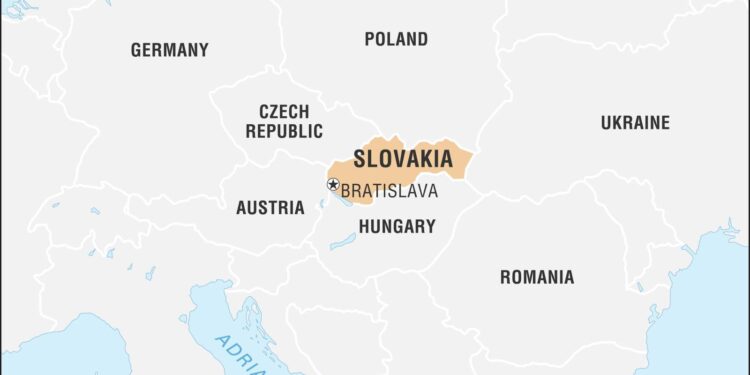Slovakia has recently enacted a new law regulating non-governmental organizations (NGOs), sparking a wave of criticism from both domestic and international observers. The legislation, aimed at increasing transparency and oversight, has raised concerns among civil society groups and human rights advocates who warn it could impede the independence and operation of NGOs in the country. This move places Slovakia at the center of an ongoing debate about the role and regulation of civic organizations in democratic societies.
Slovakia Enacts Controversial NGO Law Raising Concerns Over Civil Society Freedom
The newly enacted legislation in Slovakia has sparked widespread debate among activists and international observers who argue that it imposes stringent regulations on non-governmental organizations (NGOs), potentially undermining the autonomy of civil society. The law requires NGOs to disclose detailed funding sources, report activities more rigorously, and subjects them to increased government oversight. Supporters of the measure claim it promotes transparency and accountability, but critics warn that it may be used as a tool to suppress dissenting voices and limit foreign influence in civic initiatives.
Among the key provisions of the law are:
- Mandatory registration: NGOs must register specific funding above a set threshold within tight deadlines.
- Enhanced reporting requirements: Detailed financial and operational reports must be submitted annually to the authorities.
- Government auditing powers: Authorities are empowered to conduct unscheduled inspections and audits on NGOs.
| Provision | Effect |
|---|---|
| Funding Disclosure | Increased transparency but risk of donor intimidation |
| Annual Reporting | Greater accountability but administrative burden |
| Inspection Authority | Enhanced oversight, potential for government pressure |
Critics Warn New Legislation Could Undermine Transparency and Democratic Accountability
Leading civic groups and international watchdogs have expressed serious concerns about the newly enacted legislation, arguing that it could severely restrict the operational freedom of NGOs in Slovakia. Critics highlight that the law imposes stringent reporting requirements and increased government oversight, potentially stifling independent organizations that play a crucial role in fostering transparency and holding authorities accountable. Many fear this legal framework may be used selectively to target dissenting voices, effectively weakening democratic checks and balances.
Opponents also point to the potential for decreased public trust, as the new measures might obscure the financial sources and decision-making processes behind civil society initiatives. Transparency experts warn that without clear safeguards and balanced oversight, civic engagement risks being undermined at a pivotal moment in Slovakia’s democratic development.
- Increased Reporting Burden: NGOs must disclose detailed funding sources quarterly.
- Government Screening: New oversight body authorized to review NGO activities.
- Penalties: Possible fines and suspension for non-compliance with reporting rules.
| Aspect | Critics’ Concerns | Government Justification |
|---|---|---|
| Transparency | May limit openness by creating bureaucratic barriers | Ensures accountability of NGO finances |
| Accountability | Risk of politicized enforcement | Prevents foreign influence in domestic affairs |
| Civic Freedom | Could suppress critical voices | Promotes responsible NGO activity |
Experts Call for Dialogue and Revisions to Protect NGO Independence and Promote Inclusive Governance
Leading voices from civil society and international watchdogs have raised concerns over Slovakia’s recent legislation impacting non-governmental organizations. According to experts, the law risks undermining the autonomy of NGOs by imposing stringent registration requirements and limiting foreign funding transparency. These measures, they argue, could stifle independent oversight and restrict civic engagement, ultimately weakening the fabric of democratic governance in the country.
Advocates urge policymakers to engage in meaningful dialogue with stakeholders and reconsider the law’s provisions to foster an inclusive environment. Key recommendations emphasize the importance of:
- Protecting NGO autonomy to ensure unbiased advocacy and accountability
- Promoting transparency without imposing disproportionate burdens
- Encouraging multi-stakeholder participation in reform processes
| Key Concern | Expert Recommendation |
|---|---|
| Restrictions on Foreign Funding | Implement balanced transparency standards |
| Stringent Registration Processes | Simplify procedures to ease NGO operations |
| Limited Civil Society Input | Strengthen consultation mechanisms |
In Conclusion
As Slovakia moves forward with its new legislation governing non-governmental organizations, the debate over the balance between state oversight and civil society independence is set to intensify. Critics warn that the law could undermine democratic freedoms, while supporters argue it enhances transparency and accountability. The coming months will reveal how this contentious measure impacts Slovakia’s vibrant NGO sector and the broader landscape of civic engagement in the country.
















